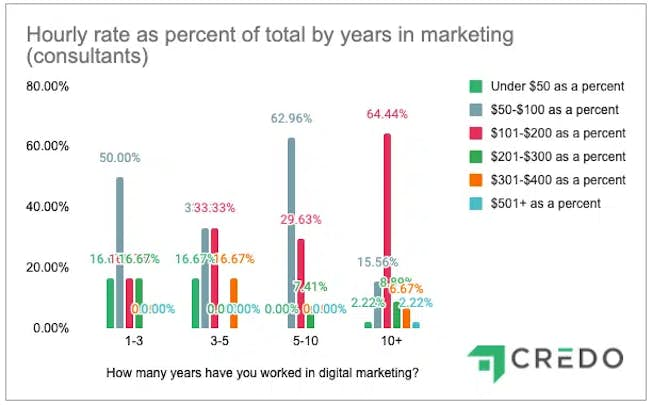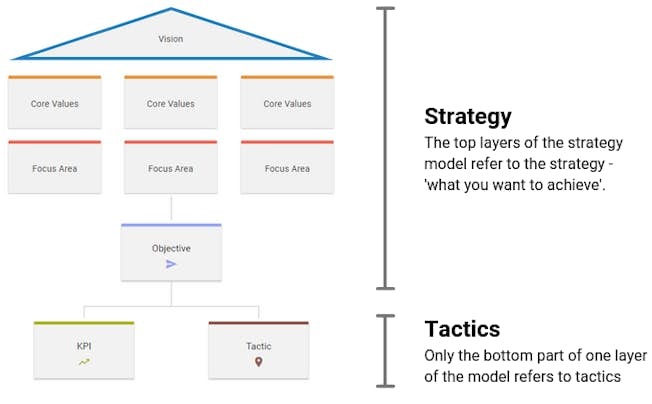Many marketers believe that the only way to achieve success in the workplace is to climb the ladder as a full-time employee. What they don’t realize is that there’s another choice: becoming a self-employed marketing consultant.
With so many digital marketing career options there’s a growing demand for skilled professionals. And the market for independent consultants is on the rise, partly driven by the fact that some companies are hesitant to invest in expensive large marketing or advertising firms, instead of wanting to invest in one expert who can train their existing internal team(s).
The management consulting industry is worth $250 billion with industry hotspots in the UK and U.S. In addition, the job growth rate for management consulting and analysts in 2022 is 14 percent which is faster than the projections for other roles.
Of course, self-employment isn’t for everyone; there are pros and cons to any job. Read on to find out more about becoming a marketing consultant to determine if it’s the best fit for you.
What Does a Marketing Consultant Do?
The job of a marketing consultant varies by company and project but typically involves advising companies on the best way to reach, engage and convert customers.
Marketing consultants can offer a range of services which include:
- Evaluating current marketing efforts and making suggestions for improvements
- Helping to devise, plan, and implement digital marketing campaigns across channels
- Training other marketers on best practices and technologies
- Offer solutions for workflows or new methods for reaching and converting consumers
- Tracking the success of marketing strategies using analytical tools
Crucially a digital marketing consultant can offer unbiased advice and solutions to drive the success of a brand’s marketing activities. Anyone in this role should have advanced knowledge of digital marketing and be able to advise on a range of key areas such as paid media, SEO, analytics, optimization, social media strategy or automation.
According to research by Credo, the average digital marketing consultant earns $147.67 per hour with the rate increasing depending on years of experience in the industry.

What Qualifications Does a Marketing Consultant Need?
If you want to become a marketing consultant, you’ll need to take certain steps to be successful. These steps include demonstrating your skills by completing a recognized industry certification, gaining relevant work experience and building a professional network and client base.
To help guide you in the right direction, here’s a rundown of the qualifications and skills you’ll need:
- An undergraduate degree in marketing, business, or communications (or an MBA with a focus on marketing, if possible)
- A great portfolio that demonstrates your history of marketing activities and success
- Several years of established experience as a full-time marketer with experience in digital technologies and tactics
- Expertise in a specific niche or experience working in a wide range of industries
- Strong copywriting and communication skills
- Marketing expertise in a wide range of areas (social media, content, SEO, lead generation, PPC, etc.)
- Marketing automation experience using software such as Marketo, HubSpot, Eloqua, Pardot, or another leading software offering
- Confidence in your skills and ready to defend your work
- Strong Excel, PowerPoint, Salesforce and Microsoft Office skills
- An understanding of strategy vs. tactic (a strategy is a plan of action with a goal, while a tactic is a specific action that is part of implementing the strategy)
- Key soft skills such as persuasion, adaptability, creativity etc.
- Leadership skills, professionalism, and a motivated attitude
- Ability to listen and empathize
If you have all of these skills (or plan to cultivate them), you’re well on your way to becoming a successful marketing consultant.

Establish Your Reputation
Now that you know the skills you need, there are some actions you can take to further cement your career success.
Build Your Reputation
You will struggle to get the clients you want (or any at all) if you can’t build trust. A great LinkedIn profile that includes recommendations along with website testimonials can help build your reputation to foster trust. There are three things a client needs to trust you: the certainty that you will deliver; the belief that you’re worth your fee, and a guarantee that you will provide a clear and timely response if they contact you.
Cultivate an Understanding of how Marketing Influences Brands
Many companies want to build a lasting brand that customers trust as they want to expand their customer base and maximize profits. Marketing consultants sometimes make the mistake of focusing solely on revenue and not considering brand perception. For example, a half-price offer might temporarily boost sales for a client and increase their profit margin. However, if the client has spent years developing an image of luxury, it could hurt the brand and damage long-term growth.
Become Indispensable
When you first start as a consultant, finding work can be difficult. You’ll need to spend a lot of time building your personal brand and earning referrals. But persevere and you will start to see repeat clients and referrals. Earning repeat clients proves you’re reliable and have achieved success. When you start to learn everything you can about your client’s company and industry, you start to become someone that's difficult to replace. Expertise takes time, and once you have it, it’s irreplaceable.
Think about auditing your skillset to determine what subjects you’re interested in, what you already know, and how you can improve especially when it comes to digital transformation across industries. Then use that knowledge to land clients in the sectors you think are best suited to your skillset.
Learn, Learn & Keep Learning
The best consultants don’t just stop learning after earning a marketing degree or specialist certifications . They constantly learn and work on their skills so they can update their clients on the latest marketing best practices and technologies. Marketing is always evolving and it's important to keep pace with the industry so you can provide the best advice and recommendations to clients.
Set the Right Price for Your Services
Knowing your worth is key so make sure you research before setting a rate. What’s an easy formula for individuals to fix a price?
Start from the bottom of your income statement, and build up to get to your top line (i.e. the fees that you will charge). Profit +Overhead = Daily Fee Revenue. In terms of labor, if you plan to take home an annual salary of $150,000 and work 260 days per year (365 days, minus Sundays, a few Saturdays, holidays and two weeks’ vacation), you’ll need to take home about $577 each day before overhead costs.
Once you know what to aim for in terms of earnings, you need to determine your overhead costs. Overheads include recurring expenses associated with running your business, such as fuel, internet fees, phone bills, postage, and equipment. If your overhead fees add up to $10,000 per year, divide that number by the number of working days per year. At 260 days, this would be about $39 dollars overhead each day.
Once you have these numbers, plug them back into the formula, and you’ll get a total of $616 each day, or $77/hr. for an eight-hour day. Make changes as necessary.
Check our salary guide for digital marketing to see what marketers in the industry are earning.
Do Thorough Research on Each Client
Before you launch into a project with a new client, there are several steps you should take to ensure you’ve done due diligence:
1. Set up Google Alerts for your client and its competitors to see all the latest news related to specified keywords. Check out this infographic to find out the steps to conduct keyword research.
2. Know basic financial data for your client. Some key numbers include overall revenue, gross profit, and market cap.
3. Familiarize yourself with the CEO and members of the senior management team. If all else fails, search LinkedIn, and memorize as many names and titles as you can.
4. Learn the client’s competitors. Do research to determine the client’s top 5-10 competitors, their relative sizes, key products and services, and their strengths and weaknesses. Periodically review this information to make sure it’s up to date.
Don’t be Afraid to Ask Good Questions
If you sometimes feel like Sherlock Holmes as a consultant, you’re on the right track! Questions help you understand the client’s needs and what you’re required to do. Never be afraid to ask for clarification; it’s always better than completing a project incorrectly.
Set up Online Promotional Channels
Even if you start getting repeat clients and referrals, you still need to promote your business. Build a great website with WordPress or another provider that showcases your portfolio and provides information about your business and your experience.
In terms of social media, pick the platforms that best showcase your business. LinkedIn is a must for any consultant, but you may also want to showcase visual work on Instagram or pick the best times to post on TikTok along with keeping up with contacts and promoting your expertise on Twitter.
You can also consider blogging to share your point of view or look to become a guest blogger on a high profile site. Conferences are also great for networking and sharing your ideas. Both methods can lend you a huge degree of credibility and audio and video clips you can share on your website. Remember, keep it high-level. Don’t talk too much about your own services; focus on what’s happening in the industry.
Keeping up-to-date on the latest marketing best practices is the first step toward working for yourself as a marketing consultant and ditching the cubicle for good. Browse our list of digital marketing courses to find the best fit for your individual needs.
Become an In-Demand Consultant with a Digital Marketing Certification
Boost your digital marketing skills and advance your career with an up-to-date digital marketing certification. DMI’s Professional Diploma in Digital Marketing covers the fundamentals of digital marketing and then dives into specialist areas such as PPC, email marketing, website optimization, PPC, Google analytics and strategy. Get your career on the right track today!
First Published 2015, Updated January 2022)
- Categories:
- Articles
- Digital Marketing
Upgrade to Power Membership to continue
your access to thousands of articles, toolkits, podcasts, lessons and much much more.
Become a Power Member- Login
- View Courses
- - - -
- Courses
- Resources
- - - -
- My Account
- Change Password
- Logout




